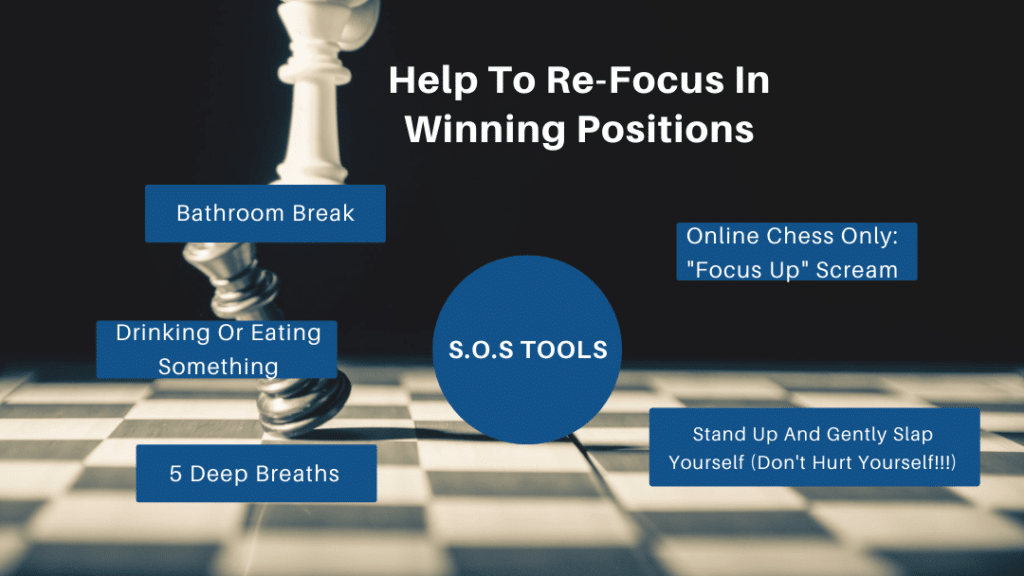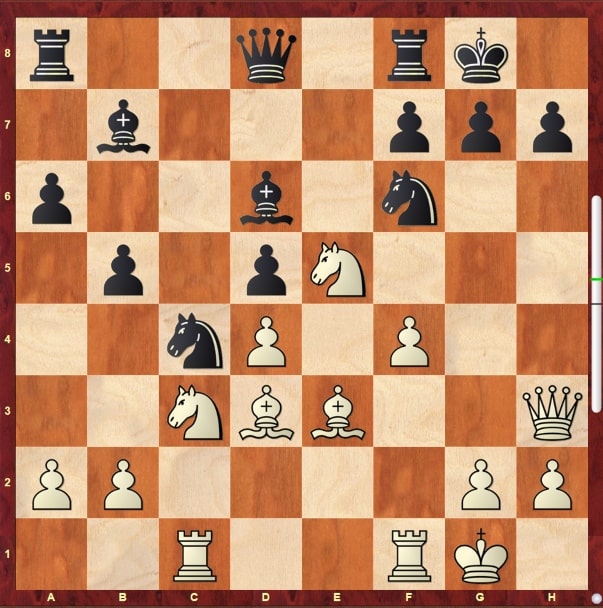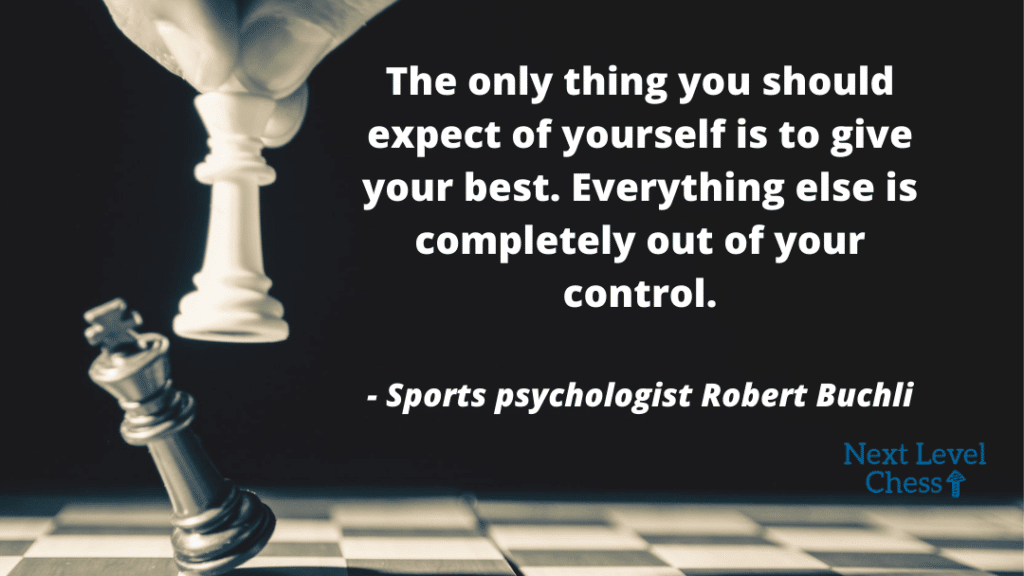Everybody knows the feeling. You are having a great position against a strong opponent and you start to feel the excitement. Your heartbeat is raising and your mind is going crazy.
“Imagine winning this game!” you start to think. Following this thought, you start to imagine different scenarios: the congratulation of your friends, the effect of that win on your rating, and your further career.
Suddenly you get a nasty awakening: the game is still going on and you just blundered your advantage. Been there, done that. This storyline has happened dozens if not hundreds of times during my career.
From thinking about what I’ll say at the interview after the game, to seeing myself sponsored by the best brands in the world: I have had many crazy dreams when having a winning position against a stronger opponent.
Here is what I learned from it and how I think you can avoid this utterly frustrating moment. If you struggle with converting winning positions because of chess problems, then this article is for you.
#1 Don’t Focus On Results
I have written a whole article on the effect of result-based thinking. In the article, I have focused on the frightening, fearful effect of result-based thinking. But on the other end of the scale, result-based thinking can also lead to over-excitement.
Similar to the extreme negativity felt when you lose (or when you anticipate losing), you start to feel extreme happiness when you win (or when you anticipate winning).
So there is a positive and negative effect of this approach, some of you might think. Not quite I have to tell you. I’m definitely not against feeling elated when winning games. After all, you should celebrate victories along the way. But excessive celebration costs a lot of energy and can lead to disastrous losses shortly after.
Especially if the emotional rollercoaster already starts when the game is still going on!
That is why the first thing you should do is to put less weight on (short-term) results. Once you understand that the result of the next game is just a small puzzle of the full picture, you will reduce the emotional energy invested.
This by itself will already cause fewer heart-break moments, because you understand a lost game is an opportunity to learn something along the way.
Actually, things can also go wrong even if you win a game.
I remember my amazing Rapid tournament in 2017 just before playing the Biel Grandmaster tournament. I scored 7/9 with a win over GM Eljanov (back then Top 30 of the World) and shared second place.
The success was emotionally so exhausting (I was even crying after the win against Eljanov), that I was already K.O. before the main event even started. It is no surprise that I quickly run out of energy and ended the tournament with six losses…
Yes, I agree, there are special occasions where it is much harder to not focus on the result.
Either when you are playing for a title-norm, or for a tournament victory you can feel as if this is the only chance in your life.
Three things on this point:
- I have come to realise that 95% of cases when we get overly excited are just extremely normal cases. This could include some rated online game (1 of thousands you play in your lifetime…), a Blitz game at a local club or any normal OTB game with few at stake.
- Even those cases that seem one in a lifetime usually aren’t one in a lifetime. Huh?
Many Grandmasters (including me) struggle with the last Norm. Every time you come close, it seems like your life is on the line. Now or never.
By now I probably scored around 10 GM Norms. When you start to play free of that silly pressure, you soon realize that it is way easier to score such a Norm… It is NOT once in a lifetime. Even if it might feel like that in the moment. - Ok, you have a once in a lifetime opportunity. You worked your whole life for this exact moment. Now what do you do? Instead of putting pressure on you, you should think: “How can I make success most likely?”. The answer will be: stick to what you know, trust yourself and focus on the process (next move). You have trained for this moment your whole life. The more energy you spend on thoughts away from the chess board, the more likely you will fail.
What To Do When The Situation Happens Again
Luckily we are not Roboters. This means that even if you read this article and agree with me, you will most likely get that feeling of early excitement again. Until the process-based approach kicks in, you need some quick fixes during the games.
The most important thing is to be aware of it happening again. Once you realize you start fantasizing about all the effects of that victory, don’t judge yourself! Even if it is not your wish to feel that way, judging yourself does NOT help.
Accept the fact that you are feeling this way and tell yourself something like “Ok, I’m getting a bit too excited. Let’s first focus on finishing that game and then think about celebration”.
This by itself might already work wonders. Modify my phrase above so that it gets really personal and fits you best. The phrase can (should) also change and vary throughout the years. The more personal and abt to your current situation it is, the better it will work.
Once you managed to get that small self-talk in, try to change something in your routine. Go take a bathroom break if possible and wash your face with water. Look in the mirror and tell yourself “I’m going to focus on my next moves and the present”.
Now you should be ready to go back to the board and able to focus on the game.
Some other ideas to get out of your thought schematic include:
- Take a sip of your drink
- 5 deep breaths where you focus on nothing else than the breath (helps getting into the present)
- Stand up and gently slap yourself to wake yourself up (yes I did this sometimes, but please don’t hurt yourself!)
- Eat something
- For Online Chess only: you can talk to yourself as you wish, use it! A loud “focus up” scream should be enough

#2 Reduce Your Expectations = Reduce Your Excitement
In my case, the big excitement in winning positions was closely linked to my huge expectations before the game. I always had the feeling I was better than my rating shows (had something to do with many screwed-up winning positions and my health problems).
Every tournament (or game) seemed to be the chance to “finally show what I truly can do”. While it is good to not be overly content with your situation and strive for more, this expectation did put a lot of pressure on every game I played.
Instead of having a “nothing to lose” situation against a much stronger player, it was a “finally show what you can” situation. Instead of playing without pressure, I put extra pressure on myself. This was meant to be the game when everything changed.
Now you can guess how this pressure only increased when I truly had a winning position on the board. It felt as my whole career depended on me finally winning this position.
In case I won I soon started to understand it wasn’t that world-changing. And in those cases I ended up not winning, my heart was broken in a thousand pieces. Honestly, I have always thought I was the only one with such strange problems. Until I played in the Swiss Team League a few weeks ago.
The 2200 That Felt He Needed To Beat Me
As I now play in the third-highest division (I’m an amateur now after all 🙂), I was sure to face somebody much lower rated than me. My opponent turned out to be somebody I faced many times in youth tournaments around 10 years ago. As expected, I won a nice game with the white pieces.
Already during the game, I felt his huge heartbreak when he missed a nice tactic and got in trouble.

I was slightly confused because to me it seemed logical that I would end up winning the game (white pieces + 350 rating points more). When we talked after the game, I recognized my younger self in his words.
It turns out he still feels the difference between himself and me should not be as big as it is. Occasionally he has very good moments and even beats GMs. These ups are then followed by horrible games and tough losses. This means he mostly lived in a hopeful future and had problems accepting the reality of the moment. This can be very dangerous.
He knew he will most likely face me. And for him, it was exactly this “today is the day I prove that I am stronger than my rating suggests” feeling. Instead of playing without pressure and enjoying a game against one of the highest-rated players he ever played, he felt stressed.
“I trained so hard for this moment. I studied tactics and prepared for all possible lines you might play. Beating you was my goal today” he told me after the game.
You read right.
A 2200 rated player was expecting to beat a nearly 2600 rated player with black. Now it all made sense. After his tactical oversight, he only could hope for a draw anymore. He should have exchanged queens and tried to hold a difficult but holdable endgame.
As he expected this to be his great day, he could not even bring himself to fight for a draw! He lost interest, tried some cheap tactical trick, and lost soon after. In this case, my opponent created the over-excitement even before the winning position happened. He actually felt more pressure in this game than I felt, which is amazing.
But as I said, I did that many times in my career. A good example was the European Championship 2019. Even though I started as Number 149, I expected to qualify for the World Cup (=TOP 23).
As soon as this was out of reach, I completely lost interest in the tournament and gave many valuable points away.
Only Expect To Give Your Best
Talking it over with my sports psychologist at the time, he said some wise words: “The only thing you should expect of yourself is to give your best”. And this is what I tried to live by in the last years of my career.
Instead of expecting a certain outcome, which does not only depend on myself but also on my opponent, I just expected my best possible performance. Everything else was completely out of my control.

Additionally, one should always strive to accept the present as it is. This does not mean you should always be content with the present. Look the truth in the eyes. You are neither under nor overrated. The rating does not lie if you play enough. Prove it over the board before you claim to be stronger than your rating shows.
This might sound like a hard truth. But it was actually super liberating for me. Once I managed to accept current circumstances, I could fully live in the present without some kind of resentment. I knew it was only a moment in time and that the learning curve was important. But I fully accepted my rating. No more feeling insane pressure against somebody 100+ rating more.
Conclusion
Lucid dreaming in winning positions is one of the most common psychological struggles in Chess. So don’t be too harsh on yourself. If you have made it down here, I’m sure you got some tools to work with.
As always you will need to apply some quick fixes with a long-term mental switch.
- Focus less on results, focus on the process instead
- Reduce your expectations
- Accept the present as it is (and also your current rating!)
Soon you will be hopefully able to keep a bit cooler head when you have a winning position. And don’t forget to celebrate (small) victories. Just make sure you are not spending too much energy on (pre-mature) celebrations during games or tournaments. It is only over when your opponent resigns.